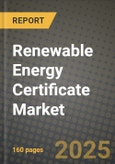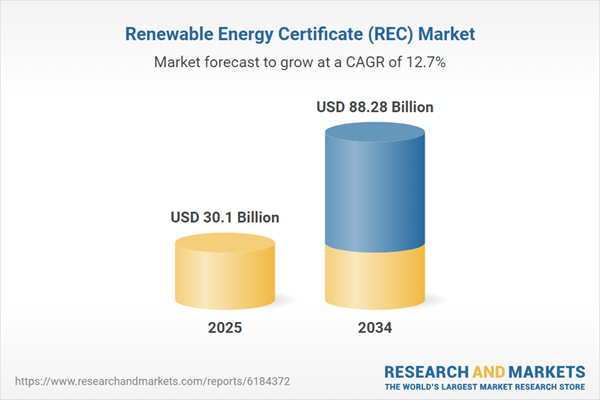Renewable Energy Certificate (REC) Market
The Renewable Energy Certificate (REC) market enables organizations to credibly match electricity consumption with renewable generation by purchasing attribute certificates that represent the environmental benefits of one unit of renewable power. RECs function as the cornerstone of market-based Scope 2 accounting, allowing buyers to decouple electricity procurement from geography and timing constraints and to scale decarbonization beyond on-site installations. Leading applications span corporate sustainability programs, utility green tariffs, retail energy products, data center and cloud operations, industrial loads with hard-to-abate footprints, and public sector targets. Recent trends include rapid maturation of certificate quality tiers (vintage, technology, geography, additionality), hourly/24×7 matching to align consumption with generation profiles, and growing linkage to digital MRV, granular metering, and anti-double-counting safeguards. Drivers include tightening corporate commitments, supply chain engagement, evolving disclosure standards, utility decarbonization strategies, and expanding registries across emerging markets. The competitive landscape comprises registries and tracking systems, certificate standards bodies, utilities and retail energy providers, project developers, marketplaces/exchanges, and sustainability platforms that aggregate procurement, settlement, and reporting. Vendors differentiate through auditability, portfolio analytics, interoperability with carbon accounting tools, and access to diversified supply (solar, wind, hydropower, bioenergy, geothermal) across compliance and voluntary schemes. Strategic issues shaping the market include the shift from unbundled annual RECs to bundled/long-term instruments (e.g., PPAs, VPPAs with bundled EACs), scrutiny around “greenwashing,” the emergence of time-stamped EACs, and integration with adjacent attributes such as low-carbon fuels and green hydrogen guarantees of origin. Execution risks remain around policy variability, grid mix evolution, buyer education, basis risk in long-term contracts, and ensuring integrity across borders and interconnected tracking systems.Renewable Energy Certificate (REC) Market Key Insights
- Compliance vs. voluntary bifurcation. Demand originates from mandated programs and corporate voluntary goals; success requires navigating program rules, eligibility, retired status, and tracking nuances while maintaining portfolio flexibility across jurisdictions.
- Quality matters more than quantity. Buyers increasingly screen for technology type, project age, grid region, and co-benefits; premium tiers reward new-build additionality, community impact, and high-integrity certification, improving narrative credibility.
- Rise of granular, time-stamped EACs. Hourly matching aligns renewable supply with consumption profiles, enabling credible 24×7 claims for data centers, hospitals, and campuses, and fostering new software layers for forecasting and settlement.
- From unbundled to bundled/value-locked deals. VPPAs/PPAs with bundled certificates mitigate price and integrity risk, support project financing, and provide long-term emission reductions with clearer additionality than spot REC purchases.
- Digitization and MRV evolution. API-first registries, smart metering, and tamper-evident audit trails reduce operational friction, enhance retirement assurance, and facilitate automated Scope 2 reporting across multi-site enterprises.
- Integration with utility green products. Green tariffs and sleeved PPAs expand access for large loads within regulated markets, letting buyers secure localized certificates aligned with grid planning and interconnection realities.
- Diversifying supply sources. While wind and solar dominate, hydro, geothermal, and qualified bioenergy broaden the stack; hybrid projects with storage improve delivery profiles relevant to hourly claims and peak coverage.
- Corporate procurement sophistication. Sustainability teams now manage REC portfolios like financial assets - hedging vintage/geography exposure, layering terms, and specifying guardrails against low-integrity instruments.
- Policy and disclosure dynamics. Shifting program rules, evolving disclosure frameworks, and auditor scrutiny elevate the need for conservative accounting, robust documentation, and alignment with recognized claims guidance.
- Adjacent attributes convergence. Guarantees of origin for green hydrogen and low-carbon fuels, plus embodied carbon disclosures, push platforms toward multi-attribute management and cross-registry interoperability.
Renewable Energy Certificate (REC) Market Reginal Analysis
North America
Market activity is anchored by robust corporate voluntary demand and a mosaic of compliance programs administered by state and provincial authorities. Utilities increasingly offer green tariffs and sleeved PPAs that bundle EACs, giving large buyers localized options. Technology platforms supporting hourly matching gain traction among data-intensive sectors. Project pipelines emphasize wind-solar hybrids and storage, enhancing certificate delivery profiles. Buyers prioritize registry integrity, double-count protections, and audit-ready retirement documentation to satisfy external assurance requirements.Europe
Guarantees of Origin (GOs) underpin a highly standardized, disclosure-centric environment, with strong emphasis on disclosure quality, consumer protection, and cross-border interoperability. Corporate buyers focus on market alignment, proximity, and additionality signals, while utilities evolve tariff structures to reflect granular attributes. Growing interest in 24×7 procurement and in coupling electricity GOs with guarantees for green gases and hydrogen drives platform innovation. Regulatory clarity and mature tracking systems encourage sophisticated, multi-year procurement strategies.Asia-Pacific
Demand accelerates as multinational supply chains localize decarbonization, supported by expanding registries and recognition of international EAC frameworks. Markets with energy-intensive manufacturing and large technology footprints adopt portfolio approaches mixing local certificates, international standards, and bundled PPAs. Utilities and retailers introduce green products targeting export-oriented firms under supplier engagement programs. Variability in policy and grid emissions factors places a premium on conservative claims, credible retirements, and localized project sourcing.Middle East & Africa
Large industrial loads, new renewable build-outs, and government-led sustainability initiatives drive early adoption. Utility-scale solar and emerging wind assets create certificate supply that supports industrial offtake and public-sector decarbonization. Corporates prioritize straightforward procurement, verifiable retirement, and alignment with national energy strategies. As markets mature, buyers explore longer-tenor deals and co-benefits such as water stewardship or local employment, while registries enhance assurance and cross-border compatibility.South & Central America
Hydropower-rich systems and expanding solar-wind development provide a diverse supply base for certificates. Export-oriented sectors and multinationals operating regional hubs catalyze voluntary demand, often pairing RECs with community impact narratives. Market growth depends on registry coverage, data transparency, and the ease of retiring certificates within international disclosure frameworks. Regional energy retailers increasingly package green offerings, while corporate buyers adopt blended portfolios to manage geography and vintage exposure.Renewable Energy Certificate (REC) Market Segmentation
By Capacity
- Up To 1000 Kwh
- 1001 - 5000 Kwh
- Above 5000 Kwh
By Energy
- Solar Power
- Wind Power
- Hydropower
- Biomass
- Others
By End-User
- Compliance
- Voluntary
Key Market players
APX/TIGR, I-REC Standard, Evident, PJM-EIS (GATS), M-RETS, Green-e (CRS), EEX/PowerNext, ICE, SRECTrade, 3Degrees, South Pole, Statkraft, Ørsted, NextEra Energy Resources, ENGIE, Shell Energy, Centrica, Enel Green Power, EDF RenewablesRenewable Energy Certificate (REC) Market Analytics
The report employs rigorous tools, including Porter’s Five Forces, value chain mapping, and scenario-based modelling, to assess supply-demand dynamics. Cross-sector influences from parent, derived, and substitute markets are evaluated to identify risks and opportunities. Trade and pricing analytics provide an up-to-date view of international flows, including leading exporters, importers, and regional price trends.Macroeconomic indicators, policy frameworks such as carbon pricing and energy security strategies, and evolving consumer behaviour are considered in forecasting scenarios. Recent deal flows, partnerships, and technology innovations are incorporated to assess their impact on future market performance.
Renewable Energy Certificate (REC) Market Competitive Intelligence
The competitive landscape is mapped through proprietary frameworks, profiling leading companies with details on business models, product portfolios, financial performance, and strategic initiatives. Key developments such as mergers & acquisitions, technology collaborations, investment inflows, and regional expansions are analyzed for their competitive impact. The report also identifies emerging players and innovative startups contributing to market disruption.Regional insights highlight the most promising investment destinations, regulatory landscapes, and evolving partnerships across energy and industrial corridors.
Countries Covered
- North America - Renewable Energy Certificate (REC) market data and outlook to 2034
- United States
- Canada
- Mexico
- Europe - Renewable Energy Certificate (REC) market data and outlook to 2034
- Germany
- United Kingdom
- France
- Italy
- Spain
- BeNeLux
- Russia
- Sweden
- Asia-Pacific - Renewable Energy Certificate (REC) market data and outlook to 2034
- China
- Japan
- India
- South Korea
- Australia
- Indonesia
- Malaysia
- Vietnam
- Middle East and Africa - Renewable Energy Certificate (REC) market data and outlook to 2034
- Saudi Arabia
- South Africa
- Iran
- UAE
- Egypt
- South and Central America - Renewable Energy Certificate (REC) market data and outlook to 2034
- Brazil
- Argentina
- Chile
- Peru
Research Methodology
This study combines primary inputs from industry experts across the Renewable Energy Certificate (REC) value chain with secondary data from associations, government publications, trade databases, and company disclosures. Proprietary modeling techniques, including data triangulation, statistical correlation, and scenario planning, are applied to deliver reliable market sizing and forecasting.Key Questions Addressed
- What is the current and forecast market size of the Renewable Energy Certificate (REC) industry at global, regional, and country levels?
- Which types, applications, and technologies present the highest growth potential?
- How are supply chains adapting to geopolitical and economic shocks?
- What role do policy frameworks, trade flows, and sustainability targets play in shaping demand?
- Who are the leading players, and how are their strategies evolving in the face of global uncertainty?
- Which regional “hotspots” and customer segments will outpace the market, and what go-to-market and partnership models best support entry and expansion?
- Where are the most investable opportunities - across technology roadmaps, sustainability-linked innovation, and M&A - and what is the best segment to invest over the next 3-5 years?
Your Key Takeaways from the Renewable Energy Certificate (REC) Market Report
- Global Renewable Energy Certificate (REC) market size and growth projections (CAGR), 2024-2034
- Impact of Russia-Ukraine, Israel-Palestine, and Hamas conflicts on Renewable Energy Certificate (REC) trade, costs, and supply chains
- Renewable Energy Certificate (REC) market size, share, and outlook across 5 regions and 27 countries, 2023-2034
- Renewable Energy Certificate (REC) market size, CAGR, and market share of key products, applications, and end-user verticals, 2023-2034
- Short- and long-term Renewable Energy Certificate (REC) market trends, drivers, restraints, and opportunities
- Porter’s Five Forces analysis, technological developments, and Renewable Energy Certificate (REC) supply chain analysis
- Renewable Energy Certificate (REC) trade analysis, Renewable Energy Certificate (REC) market price analysis, and Renewable Energy Certificate (REC) supply/demand dynamics
- Profiles of 5 leading companies - overview, key strategies, financials, and products
- Latest Renewable Energy Certificate (REC) market news and developments
Additional Support
With the purchase of this report, you will receive:- An updated PDF report and an MS Excel data workbook containing all market tables and figures for easy analysis.
- 7-day post-sale analyst support for clarifications and in-scope supplementary data, ensuring the deliverable aligns precisely with your requirements.
- Complimentary report update to incorporate the latest available data and the impact of recent market developments.
This product will be delivered within 1-3 business days.
Table of Contents
Companies Mentioned
- APX/TIGR
- I-REC Standard
- Evident
- PJM-EIS (GATS)
- M-RETS
- Green-e (CRS)
- EEX/PowerNext
- ICE
- SRECTrade
- 3Degrees
- South Pole
- Statkraft
- Ørsted
- NextEra Energy Resources
- ENGIE
- Shell Energy
- Centrica
- Enel Green Power
- EDF Renewables
Table Information
| Report Attribute | Details |
|---|---|
| No. of Pages | 160 |
| Published | November 2025 |
| Forecast Period | 2025 - 2034 |
| Estimated Market Value ( USD | $ 30.1 Billion |
| Forecasted Market Value ( USD | $ 88.28 Billion |
| Compound Annual Growth Rate | 12.7% |
| Regions Covered | Global |
| No. of Companies Mentioned | 19 |









